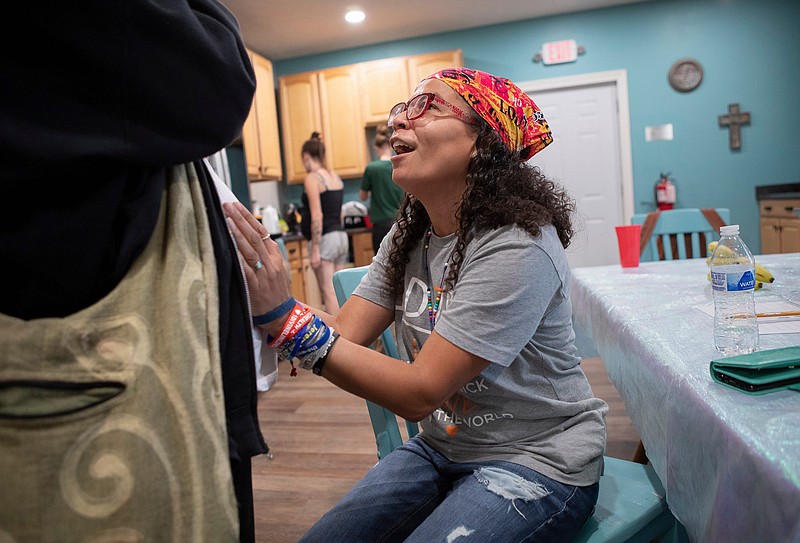COLUMBUS, Ohio – Esther Flores always wears a bandana on her head.
She wears it on the street. She even wears it when meeting city officials. Beyond mere fashion choice, the bandana serves a purpose.
“The girls are so traumatized,” said Flores, 48. “They may not remember my name. But they’ll remember the bandana.”
Most decisions Flores makes are similarly centered on the people she serves: victims and survivors of human trafficking and domestic violence. Through her nonprofit, 1DivineLine2Health, Flores offers trauma-informed and responsive care to homeless women and girls and those with substance use issues.
In addition to operating two safe houses in Linden and on the Hilltop, Flores runs a drop-in center on Sullivant Avenue where women and girls can eat a home-cooked meal, grab clean clothes, take a warm shower and rest. Also on the Hilltop is 1DivineLine2Health’s butterfly garden, where the organization hosts a camp each summer for nearly two dozen children to play games, make s’mores and appreciate nature in the middle of Columbus.
And, of course, there are the nonprofit’s two red “love bugs”: vans filled to the brim with bags of clothes and boxes of first-aid kits that are handed out to people on the street.
Since 2015, the trained nurse has been on the streets of Columbus treating infected wounds, saving people with the overdose reversal drug naloxone and offering food, clothes and condoms to people experiencing homelessness. It was the kind of care she originally intended to provide to people abroad, but after a trip helping human trafficking victims in Guatemala, Flores said she learned about the people in her own city who have been hurt and traumatized by human trafficking.
The number of human trafficking victims in Columbus is unclear. But Columbus ranked eighth among U.S. cities in numbers of calls to the National Human Trafficking Hotline from 2007 to 2016.
What Flores knows is that she helped 3,094 women in 2020, most of whom had been at one point trafficked, abused or sexually assaulted.
Flores aims to make 1DivineLine2Health safe, welcoming
Always aware of the trauma the people she helps have endured, Flores aims to make 1DivineLine2Health as safe and welcoming as possible. The drop-in center, for instance, is decorated like a regular house — murals line the walls and teal chairs sit around a dining room table. Upstairs, there’s a play area for children with brightly colored toys and fixtures.
At the center, women color and paint, watch TV and take naps on the couch. Flores said she designed the center to engage all five senses — an informed approach to trauma that helps people focus on the present moment of safety.
“I wish I would have known you a long time ago,” Pam Gatewood, a volunteer at 1DivineLine2Health and human trafficking survivor, told Flores one recent day. She said Flores is one of the most caring people she’s ever met.
Everyday Heroes: 2020 honorees
Vanita Lewis, who runs workshops on entrepreneurship for people who are currently or formerly incarcerated, spoke similarly of Flores. She heard Flores speak at a conference in 2018 and has followed her work ever since. Although Lewis only knows her professionally, she said Flores’ passion for the work she does and her compassion for the people she serves is what led her to nominate Flores as an Everyday Hero.
“The energy she puts into just one individual, it just touches your heart,” Lewis said.
On one Monday evening in 1DivineLine2Health’s drop-in center, Flores channeled that energy into making phone calls to a treatment center in Dayton for a bandana-clad woman. When the center didn’t answer and the woman began to cry, Flores asked if it was OK to touch her before enveloping her in a hug.
“You are a warrior,” Flores said to the woman.
Later, while wiping tears from her eyes, Flores laughed after recognizing the bandana on the woman’s head as one of her own. She’s given her bandanas to many women and girls she’s worked with over the years.
It helps them remember each other, she said.

